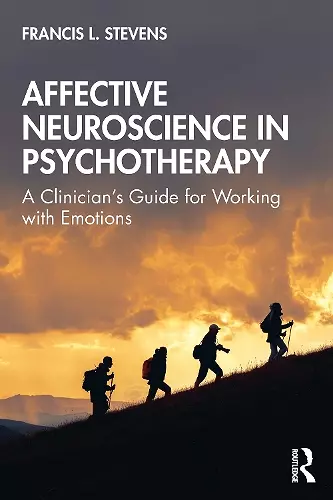Affective Neuroscience in Psychotherapy
A Clinician's Guide for Working with Emotions
Format:Paperback
Publisher:Taylor & Francis Ltd
Published:28th Sep '21
Currently unavailable, and unfortunately no date known when it will be back
This paperback is available in another edition too:
- Hardback£135.00(9780367714420)

Most psychological disorders involve distressful emotions, yet emotions are often regarded as secondary in the etiology and treatment of psychopathology. This book offers an alternative model of psychotherapy, using the patient’s emotions as the focal point of treatment. This unique text approaches emotions as the primary source of intervention, where emotions are appreciated, experienced, and learned from as opposed to being regulated solely.
Based on the latest developments in affective neuroscience, Dr. Stevens applies science-based interventions with a sequential approach for helping patients with psychological disorders. Chapters focus on how to use emotional awareness, emotional validation, self-compassion, and affect reconsolidation in therapeutic practice. Interventions for specific emotions such as anger, abandonment, jealousy, and desire are also addressed.
This book is essential reading for clinicians practicing psychotherapy, social workers and licensed mental health counselors, as well as anyoe interested in the emotional science behind the brain.
"The field of mental health has been starving for a more comprehensive, integrative explanation for positive treatment effects in psychotherapy. Dr. Francis L. Stevens's Affective Neuroscience in Psychotherapy: A Clinician's Guide for Working with Emotionsexplains what we have been missing all along."
Karin Maria Hodges, Psychologist, Private Practice, Concord, MA
"Cognitive approaches to psychotherapy have come to dominate the field in recent decades, in part because of their solid scientific foundation. They typically view emotional distress as a symptom to be reduced. Psychotherapy approaches that emphasize experiencing and processing emotional distress are effective but less well validated. This excellent book aims to restore the balance and does more to link recent advances in basic affective neuroscience and psychotherapy practice than any other. Recommended for beginning psychotherapists as well as any clinician who takes emotional processing in psychotherapy seriously and wants to know how and why it works."
Richard D. Lane, M.D., Ph.D., Professor of Psychiatry, Psychology and Neuroscience, University of Arizona; Editor (with Lynn Nadel) of Neuroscience of Enduring Change: Implications for Psychotherapy (Oxford University Press)
"Dr. Stevens has done a fine job of compiling recent information on affective neuroscience and its application to therapy. His clinical examples help to illustrate key concepts. This book provides a helpful introduction to these topics."
Alexis D. Abernethy, Ph.D., Professor of Clinical Psychology , School of Psychology & Marriage and Family Therapy, Fuller Theological Seminary
ISBN: 9780367714406
Dimensions: unknown
Weight: 220g
175 pages